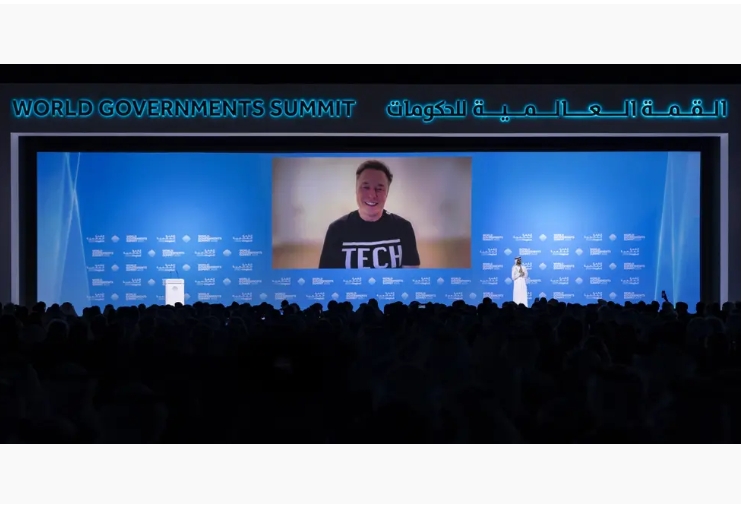Elon Musk took the stage at the World Governments Summit in Dubai on February 13, 2025, in a virtual discussion with H.E. Omar Sultan Al Olama, the UAE Minister of State for Artificial Intelligence, Digital Economy, and Remote Work Applications. Wearing a “Tech Support” T-shirt, Musk shared his vision for enhancing government efficiency through technological innovation and reducing bureaucratic overhead.
Musk, known for his ventures in electric cars, space travel, and technology, emphasised the need to streamline government operations by downsizing institutions and promoting accountability. He argued that reducing regulations and government spending could spur economic growth, aiming for a target of 4-5% growth without inflation by 2026.
“The rule of bureaucracy is something we have to overcome,” Musk stated, suggesting that many government systems are outdated and inefficient. He highlighted the example of the U.S. pension system as a case of outdated technology and quipped, “The U.S. government needs tech support.” Musk added that updating government systems could help lay the foundation for long-term prosperity.
Foreign policy was also a topic of discussion, with Musk suggesting that the U.S. should adopt a less interventionist approach. He argued that the country should “mind its own business” rather than seek regime change abroad. Musk also touched on the need for improvements in basic education, noting the U.S.’s low ranking in the Organisation for Economic Co-operation and Development (OECD) on education metrics.
Musk’s remarks were accompanied by the announcement of his new AI model, Grok 3.0, set to launch in the coming weeks. Describing the model as “scary smart,” Musk claimed that it could be the last time any AI surpasses Grok.
On the subject of AI, Joseph Tsai, Chairman of Alibaba Group, discussed the evolving value of AI, not in possessing the most advanced systems, but in how AI is applied to solve real-world problems. Tsai likened AI development to raising children, where the focus should be on practical applications, allowing both large and small companies to contribute to AI’s power.
Arvind Krishna, CEO of IBM, and Sundar Pichai, CEO of Google, both expressed their excitement for the potential of quantum computing. Pichai revealed that Google’s quantum computing had performed a computation in just five minutes that would have taken the fastest supercomputers more than 10 septillion years. Pichai suggested that governments should start preparing for the arrival of quantum computing, though it may be too early to regulate it effectively.
Public health was another key theme at the summit. Pascal Soriot, CEO of AstraZeneca, highlighted the importance of early disease diagnosis and preventive healthcare. Soriot noted that a majority of deaths are from preventable diseases but lamented that only a small fraction of healthcare budgets is spent on prevention. He predicted that AI would play a key role in improving healthcare systems, particularly in diagnostics and drug development.
David Baszucki, CEO of Roblox, also explored the role of AI in education, with a focus on interactive learning experiences for young users. He predicted that virtual learning environments would evolve significantly in the next 20 years.
The Summit also addressed global economic challenges, with IMF Managing Director Kristalina Georgieva discussing the need for innovative financial mechanisms to address economic crises and support developing countries.
As discussions on AI, quantum computing, and global cooperation unfolded, the World Governments Summit underscored the vital role of technology in shaping future governance, healthcare, education, and economic systems.


